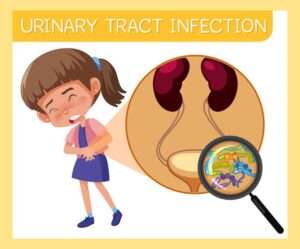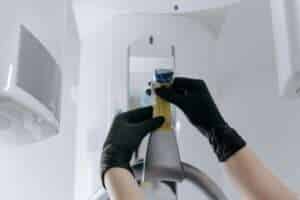UTIs in children
- Dr Owais Rafiq
- August 12, 2024
- 8:44 am

Understanding Your Child’s UTI: Causes, Risks, and Home Treatments
Thinking your child is experiencing something rare? Take deep breaths, because that isn’t the case with Urinary tract infections. UTIs are common in children. Surprised? As uncomfortable as they can be, we have countless treatment options before they impact your kid’s urethra, bladder, ureters, or kidneys.

Causes
UTIs in children are often the result of bacteria that is stubbornly stuck. The E. coli bacteria is the usual kind most kids experience along with other types that are less frequent compared to Escherichia coli.
Risk Factors
- Not wiping properly can lead to unwanted bacteria development
- Constipation prevents complete emptying which in turn creates a playground for bacteria to have all the fun it wants.
- The Vesicoureteral reflux (VUR) condition where urine flows backward (bladder to the kidneys).
- Boys who haven’t been circumcised develop a higher risk of having to deal with UTIs.
- Any unchecked abnormalities in the Urinary tract
- Holding urine for a long time

Symptoms
Symptoms of UTIs in children can vary depending on their age:
Infants:
- Fever
- Irritability
- Poor feeding
- Vomiting
- Foul-smelling urine
Toddlers and Older Children:
- Frequent urination
- Painful urination (dysuria)
- Urgency to urinate
- Abdominal or back pain
- Fever
- Bedwetting (in children who have been dry)

Diagnosis
Diagnosis typically involves Urinalysis which is a testing done on a urine sample to spot any signs of early or severe infection. Urine Culture which means growing bacteria from a urine sample to identify the specific kind of bacteria causing the UTI.
Treatment & Prevention
Antibiotic Treatment
Keeping in mind your child’s age, their doctor will prescribe any necessary antibiotic and share the treatment duration also considering how bad the infection really is and the type of bacteria bothering your kid. What you have to do is to focus on completing the full course of antibiotics even if your little fighter starts feeling better. This is only to make sure the infection doesn’t make a drastic re-appearance.
Hydration
Water fixes everything, literally. So, encourage your kid to drink plenty of fluids to help the bacteria move out from the urinary tract without throwing any tantrums. This can also be made easier through fluids like Cranberry Juice.
Diet and Nutritional Support
- Yes, you read that right. Yogurt contains probiotics that help maintain a healthy balance of bacteria in your child’s gut and urinary tract.
- It’s high time to leave out any junk from the fast-food chains and switch to high fiber available only in fresh fruits, vegetables, and whole grains. These prevent constipation by reducing pressure on the bladder.
- Vitamin C rich foods like oranges, strawberries, and bell peppers, can acidify the urine and prevent the bacteria from growing further.

At-Home Care
- Consider it your duty to demonstrate to your child via educational videos on how to wipe properly to prevent the spread of bacteria from the anus to the urethra, followed by a thorough hand wash to get rid of the germs.
- Emptying the bladder is one crucial habit each child must develop in order for the bacteria to flush out the body so keep an eye out for any instances where you might notice your kid holding in urine for a longer period than normal.
- A bubble bath, to your child’s disappointment, is not recommended here. A simple warm bath can do the job well by soothing discomfort
- Avoid storing or using any harsh soaps that can irritate the urethra or the skin in general.
- Tight clothing, especially undergarments should be avoided at all cost since it can irritate the skin, sometimes causing severe ache around the area. Find a loose-fitting, cotton underwear for your kid that allows proper air circulation and reduces moisture.
When to Seek Medical Attention
Parents should seek medical attention if their child has:
- Symptoms of a UTI
- Persistent fever without a clear cause
- Back or abdominal pain
- Unusual irritability or lethargy
- Blood in the urine
To make sure none of this happens to your kid, early diagnosis and treatment are crucial to prevent major complications like kidney damage. Stay in contact with your child’s doctor for a regular follow-up especially if UTIs start to become frequent despite all the care.
Dr Owais Rafiq
Subscribe to Dr Owais YouTube channel
For parenting advice, child health, symptoms, causes and treatment of illness in children.





